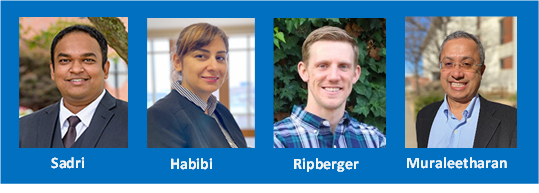
NSF Awards Planning Grant to Develop Foundation for Risk Sharing Network for Underserved OK Tribal Communities
EPSCoR Update - December 2022

Dr. Arif Sadri, Assistant Professor of the School of Civil Engineering and Environmental Science (CEES) at the University of Oklahoma (OU), Norman, OK, received a one-year planning grant ($150,000) through NSF’s Smart and Connected Communities (SCC) Program titled as “Trust Formation and Risk Communication in Underserved Communities during Compound Hazard Events through Online and Offline Social Networks (TRUCHE)”. Dr. Sadri collaborates with other colleagues from OU: Drs. Golnaz Habibi from School of Computer Science, Joseph Ripberger from Department of Political Science and Institute for Public Policy Research and Analysis, and K.K. “Muralee” Muraleetharan also from CEES. This NSF grant will prepare the research team to propose a well-developed SCC Integrative Research Grant proposal in the future.
“Accurate communication about hazardous events is important to saving lives, minimizing adverse impacts in at-risk communities, and creating more proactive and resilient communities. Community-based social networks offer a critical resource during crisis response; however, it remains a challenge to enable innovative, community-based coordination mechanisms that would allow more proactive sharing of risk information through online and offline social networks,” Sadri said.
The overall goal of this planning grant is to lay a foundation for a risk sharing network that will advance the understanding of how a system of diverse actors at different levels of social system, embedded with smart and social media tools, collectively generate community resilience. The research team will organize a series of activities to develop the foundation for a risk sharing network for the underserved tribal communities in Oklahoma that will produce a set of actionable insights and operations for promoting resilience. The team specifically aims to 1) build a comprehensive understanding of the interactive features of community-based risk and information sharing processes with key stakeholders’ engagement; and 2) advance coherent theoretical and computational insights from several strands of scientific literature to develop effective coordination mechanisms among diverse actors in a social system.
“Our project will generate transformative knowledge that will be instrumental in responding to future crisis events,” Sadri said.
____________
